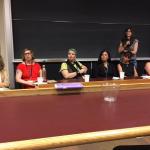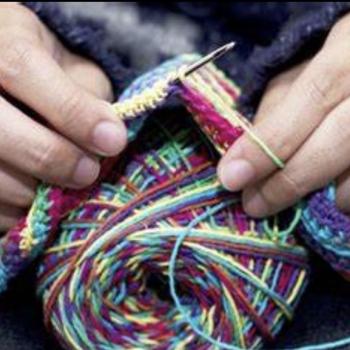
Some Catholics are ferociously angry at James Martin, SJ’s recent book, Building a Bridge: How the Catholic Church and the LGBT Community Can Enter Into a Relationship of Respect, Compassion, and Sensitivity. “Father James Martin is one of the most vocal advocates for the Catholic Church’s acceptance of active homosexuality,” sensationalist LifeSite News railed. Church Militant reported that 77 percent of its followers think Fr. James Martin should be defrocked and laicized (that is, stripped of his priestly “powers” and capacity to confect sacraments) because of his “heresy” and “homosexualist” agenda (that’s right—CM even made up their own word, specially for this controversy). These are fringe sites, and we won’t link to them here, because we can’t bring ourselves to give them any more clicks. But fringe though they may be, internet smear campaigns they’ve started are having a real impact. Catholic institutions are telling Martin that even if they agree with what he’s saying and writing, they can’t honor their invitations to bring him to speak. Apparently because people won’t stop calling and yelling at their receptionists.
“The situations were so terrifically fraught with fear for these organizations, fear of protests, fear of violence, fear of bad publicity, fear of angry donors, fear of lost donations, fear of offending, and on and on,” said Martin. “When two of the organizers called me, I could hear the anguish in their voices.”
Fox News ran an article with a headline defining Martin as a “pro-gay” priest, reporting: “while long known for his support of the LGBTQ community, his [Martin’s] book intensified an increasingly rancorous debate within the Catholic Church over whether its millennia-old proscription against homosexual activity should be changed.”
Really? Did we read the same book?
Likely not, is my answer. I have yet to come across an article by any naysayers that actually addresses the arguments and proposals in Building a Bridge at all. Fox News barely mentioned the book itself, choosing to focus instead on criticisms made by Cardinal Robert Sarah, and criticisms made about Martin in general by Bishop Thomas Paprocki of Springfield, IL, and Michael Voris, producer of Church Militant.
So I’m calling bullshit on all of you—I don’t think you even read the book.
How do I know? Because the book is boring, guys!
*Fr. Martin, if you’re reading this, please take no offense—I love your work dearly. But you know it, and I know it. There’s nothing controversial in the whole thing.*
Martin doesn’t go near the Church’s teaching on homosexual acts. He doesn’t contradict (or even call into question) a single Church teaching–a disappointment to many in the Catholic LGBT community. But this is a pastoral book, not a doctrinal one. It’s a book about how to be a caring Christian for and with people every day, specifically those who identify themselves as LGBTQ+. Building a Bridge is essentially a meditation on what we’ve already been taught–paragraph 2358 in the Catechism of the Catholic Church.
Yeah, you read that right—this book that has people so up in arms as to demand the cancellation of speaking engagements, invent new words like “homosexualist” and call for the defrocking of a priest—is a 147 -paged reflection on a couple sentences from the Catechism.
It is a tame little book. But it is a worthwhile one, because it serves as a gentle examination of conscience for ears that will hear and eyes that will see. If you actually read it, you will find no excoriating passages here, nothing fiery aimed at either the LGBT community OR the Catholic Church.
But it does ask us, that is, all baptized Catholics, to take to heart the exhortation of the Catechism to treat the LGBT community with “respect, compassion, and sensitivity.”
That’s it.
This should not be controversial.
While the first 40 or so pages walk the Church hierarchy through the process of looking at the LGBT community with said “respect, compassion, and sensitivity,” the next call on the LGBT community to look toward the Church hierarchy and do the same. As Martin sees it, no structure can earn the name “bridge” without action in both directions. He admits that it may be hard for the LGBT community to treat the hierarchy with charity if they’ve been hurt by the institutional Church, he insists that compassion and respect are the duty of any Christian. We must always choose love, no matter how much pain we’re in.
The rest of the book contains Scripture passages aimed at helping us do a sort of lectio divina. It works to assist all Christians, regardless of sexual orientation, to locate their meaning and inheritance as children of God in the Scriptures. Fr. Martin holds up a mirror, showing the LGBT community, their families, and their allies that the Living God speaks to them through the Word, as well. Martin offers passages and reflections on the importance of naming in the book of Genesis, the variety of gifts in Paul’s letters to the Corinthians, the parable of the Good Samaritan, and others.
Building a Bridge is a book of prayer and a call for reconciliation. It is decidedly not an incendiary document aimed at changing Church teaching. In many ways, this book is a gift, regardless of where we stand on the Church’s stance concerning homosexuality, because it shows us all the places within our teaching that call us to love. It also exposes the fault lines of fear, hatred, and homophobia. Within the Church’s teaching as it stands, we have the space and the duty to act as the People of the God Who is Love. We’re called to create spaces of union and safety for all of our brothers and sisters, helping them “remain on the Vine.” This is already our explicit call, and Fr. Martin challenges us to honor that.
Fr. Martin has responded in America magazine to more reasoned critiques from both sides–to Rev. Dwight Longenecker, who objects in an article for Crux to Martin’s use of the word “gay,” and to commentator Sally Kohn, who said in the Washington Post that Martin fundamentally misunderstands the Church’s antagonism to homosexuality. She finds it offensive and ridiculous to ask a group of marginalized people to honor their oppressors.
But sadly, a genuine engagement of ideas and striving for truth in love is not what we’re seeing from the Catholic hysteria regarding James Martin’s book.
Haters, if you think I’ve done you wrong here, prove it by publishing a masterful review of Building a Bridge. Let it be thorough, and let it also be prayerful. Let it be doctrinally faithful, intellectually sound, and grounded in goodwill.
Let it cite the text.
And yes, you can take that as a challenge to actually read the book.
Holly Mohr is an educator, writer and mother based in Pittsburgh, PA. You can find her wrestling with truth, love, and the urge to get feisty any day of the week.












